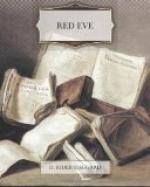“That is so, Sire,” and he told him all the tale.
“A strange case truly, Sir Hugh,” said the King when he had heard it out. “I’ll write to Clement for you both, but I doubt me whether you and your Eve will get justice from him, being English. England and Englishmen find little favour at Avignon just now, and mayhap Philip has already written on behalf of de Noyon. At the best His Holiness will shear you close and keep you waiting while he weighs the wool. No, Red Eve is right: this is a knot soonest severed by the sword. If you should find him, de Noyon could scarce refuse to meet you, for you shall fight him as the champion of our cause as well as of your own. He’s at Venice, for our Envoy there reported it to me, trying to raise a fresh force of archers for the French.
“You have leave to go, Sir Hugh, who deserve much more, having served us well,” went on the King. “We’ll give you letters to Sir Geoffrey Carleon, who represents us there, and through him to the Doge. Farewell to you, Sir Hugh de Cressi, and to you, Captain Richard the Archer. When all this game is played, return and make report to us of your adventures, and of how de Noyon died. The Queen will love to hear the tale, and your nuptials and Red Eve’s shall be celebrated at Westminster in our presence, for you have earned no less. Master Secretary, get your tools, I will dictate the letters. After they are signed to-morrow, see them into the hands of Sir Hugh, with others that I will give him for safe carriage, for alas I have creditors at Venice. Make out an open patent also to show that he and this captain travel as our messengers, charging all that do us service to forward them upon their journey.”
Three days later Hugh and Grey Dick, in the character of royal messengers from the King of England to the Doge of Venice, took passage in a great vessel bound for Genoa with a cargo of wool and other goods. On board this ship before he sailed Hugh handed to his father letters for Eve and for Sir Andrew Arnold. Also he received from him money in plenty for his faring, and bills of exchange upon certain merchants of Italy, which would bring him more should it be needed.
Their parting was very sad, since the prophecies of Sir Andrew had taken no small hold upon Master de Cressi’s mind.
“I fear me greatly, dear son,” he said, “that we part to meet no more. Well, such is the lot of parents. They breed those children that heaven decrees to them; with toil and thought and fears they rear them up from infancy, learning to love them more than their own souls, for their sakes fighting a hard world. Then the sons go forth, north and south, and the daughters find husbands and joys and sorrows of their own, and both half forget them, as is nature’s way. Last of all those parents die, as also is nature’s way, and the half forgetfulness becomes whole as surely as the young moon grows to full. Well, well, this is a lesson that each generation must learn in turn, as you will know ere all is done. Although you are my youngest, I’ll not shame to say I have loved you best of all, Hugh. Moreover, I’ve made such provision as I can for you, who have raised up the old name to honour, and who, as I hope, will once more blend the de Cressis and the Claverings, the foes of three generations, into a single House.”




